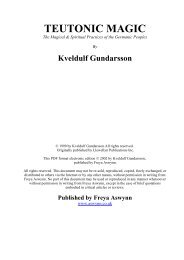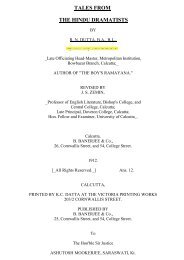Untitled - Awaken Video
Untitled - Awaken Video
Untitled - Awaken Video
Create successful ePaper yourself
Turn your PDF publications into a flip-book with our unique Google optimized e-Paper software.
Chapter 3. Midgard 85<br />
The concept of ¸orlög was understood by those who did not embrace any religion.<br />
They may not have believed in the World Tree, Yggdrasil, but they understood its<br />
function; they may not have accepted the idea of the flowing of the Waters of Life,<br />
but they understood the workings of power;<br />
“Among these unbelievers was the Danish Hrolf Kráki, ‘most famous of all<br />
kings of ancient days’. Neither Hrolf nor his chosen champions ever sacrificed<br />
to the gods, but believed only in their own might and main (ON = a matt<br />
sinn ok megin). Hrolf once exclaimed that it was not the wicked Óðínn who<br />
governed men’s lives, but rather fate (auðna).” 36<br />
In spite of the fact that atheists, or near atheists, existed, everyone (for the most<br />
part, because there are always exceptions) subscribed to the same set of spiritual<br />
principles. Turville-Petre in his discussion about the possible origins of the Hávamál<br />
and the common knowledge that this poem was composed by several skalds (Germanic<br />
poets) even suggests that part of it may have been written by one or several<br />
of these “godless men.”<br />
“Although the title Hávamál (Sayings of the High One) is given to the<br />
whole collection only two of the first seventy-nine strophes contain allusion to<br />
Óðínn. The rest tell hardly anything about religion or belief in gods. They<br />
read rather like the words of one who has travelled far and seen much (st..<br />
18), and had come to despise tradition and all the comfort which traditional<br />
religion might bring with it. Yet the title Hávamál is not altogether inappropriate,<br />
even to this part of the collection. As I have attempted to explain,<br />
the cult of Óðínn, in some of its aspects, represents a breach with tradition<br />
and a rejection of traditional morality and social organization. In this way<br />
the cult of Óðínn draws near to atheism.” 37<br />
The author is addressing the fact that many men left their homelands and communities<br />
during the Viking Age to sail the open seas. These men did not remain in<br />
any single place long enough to embrace any of the religious/ cultural aspects of the<br />
locale but still felt the need to adhere to a spiritual philosophy which would enable<br />
them to access power/ luck during their short stay on Midgard. This sophisticated<br />
philosophy was collected at some point during the Viking Age or within a few centuries<br />
thereafter and has come down through the centuries known as the Hávamál.<br />
As discussed in Chapter 1, the poem is a collection of pieces of wisdom which when<br />
applied in life will allow an individual to grow in luck and power. Like the Chinese<br />
philosophy of Taoism (as opposed to the religion of Taoism), it encourages a person<br />
36 Turville-Petre, p. 264.<br />
37 ibid., p. 267.
















